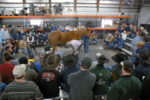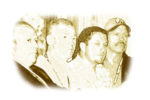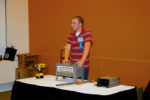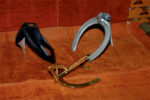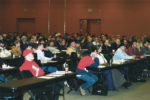Advertise Follow Us
Ron Perszewski
Ron Perszewski is a freelance writer and former associate editor of American Farriers Journal.
ARTICLES
The Homemade Hoof
Hall Of Fame farrier Jim Keith offers his own take on hoof balance and how it can change with the conditions that the horse calls home
Read More
Product Knowledge
Hooves Too Wet? Too Dry? Try These Techniques
These farriers have plenty of experience with moisture problems, too much or too little, and they offer their solutions
Read More
Tool Use
Keep Your Forge Efficient By Replacing The Liner
Time is money, so waiting for an inefficient forge to heat horseshoes adequately can hit you right in the wallet. Prevent that from happening with this step-by-step process
Read More
Product Knowledge
Unsticking the Doubts About Hoof Adhesives
Knowing the properties of the available glues can help farriers make the right choices for effective, lasting glue-on shoes and hoof repairs
Read More
Tool Use
Underused Hoof Gauge Can Boost A Farrier’s Success
This low-tech tool offers an edge when it’s time to assess a hoof and determine the work to be done
Read More
International Hoof-Care Summit Delivers On Its Promise Of Ideas
Presenters and attendees from around the globe gather to share their thoughts on doing right by the horse in ways old and new
Read More
Flies are the Worst -- Deal With it!
Commercial sprays have their place, but also limitations, so farriers have found ways to provide relief from biting insects for themselves and their horses
Read More
Apply Two Basic Principles to the Long-Toe, Low-Heel Hoof
Trim away the bent horn tubules to get down to the straight ones, and deal with each foot on its own merits, says a noted farrier and teacher
Read More
Top Articles
Current Issue
American Farriers Journal
American Farriers Journal is the “hands-on” magazine for professional farriers, equine veterinarians and horse care product and service buyers.
How Tariffs Affect Farrier Supplies
Influencing Diagonal Gait of Trot
USDA Rule Goes Too Far
Current Issue
Special Report For Equine Veterinarians
American Farriers Journal is the “hands-on” magazine for professional farriers, equine veterinarians and horse care product and service buyers.
Must Read Free Eguides
Download these helpful knowledge building tools
- Spring Hoof Care
- Winter Hoof Care
- Caring for Your Horse During a Pandemic
- CBD Products Have Promise for Farriers, but Buyer Beware
Videos
Hoof Care on Parade
Greg Martin, CJF, of Boerne, Texas, takes the unique approach of marketing his hoof-care practice with a Christmas parade float in Boerne and Comfort, Texas. The award-winning float boasts a variety of surprising features.
Events
Trimming Donkeys: Trimming Protocol, Hoof Distortion, and Laminitis Webinar Part 1
Date: 04/03/25
Location: CO
View Event
Top Directory Listings
Life Data Labs Inc
Life Data Labs Inc. is a dedicated product manufacturer committed to producing premium quality animal nutrition and health products through continuous product improvement and new product development. First-class ingredients, fresh products, consistent high quality and scientifically proven effectiveness are the principal features of Life Data Labs animal health products. And that's why they've produced the #1 recommended hoof supplement by farriers for 12 consecutive years.
Kawell USA
Kawell develops and produces copper alloy horseshoes and inserts, giving horses the care that they need to fight issues associated with white line disease, seedy toe and thrush.
SmartPak
From the feed room to the tack room, SmartPak offers innovative solutions to help riders take great care of their horses. SmartPak was founded in 1999 with the introduction of the patented SmartPak™ supplement feeding system. The revolutionary, daily dose SmartPaks are custom-made for your horse, individually labeled and sealed for freshness.


